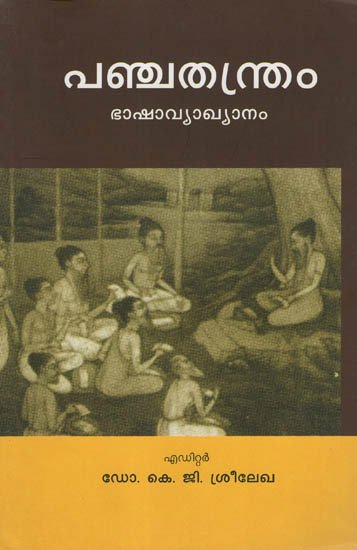Panchatantra [sanskrit]
by Dr. Naveen Kumar Jha | 2016 | 13,828 words | ISBN-13: 9788193077962
The Sanskrit edition of the Panchatantra referencing the English translation and grammatical analysis. Written by Vishnu Sharma and possibly dating as early as 1200 BCE, the Panchatantra (or Pancatantra) represents a collection of short stories teaching basic ethical values and moral conduct that was commonly practiced in ancient Indian. Alternative titles: Śrīviṣṇuśarman Pañcatantra (श्रीविष्णुशर्मन् पञ्चतन्त्र, Śrī-viṣṇuśarman pancatantra, श्री-विष्णुशर्मन्, Sri-visnusarman)
Verse 3.188
श्वेतं पदं शिरसि यत् तु शिरोरुहाणां स्थानं परं परिभवस्य तद् एव पुंसाम् ।
आरोपितास्थि-शकलं परिहृत्य यान्ति चाण्डाल-कूपम् इव दूरतरं तरुण्यः ॥ १८८ ॥
śvetaṃ padaṃ śirasi yat tu śiroruhāṇāṃ sthānaṃ paraṃ paribhavasya tad eva puṃsām |
āropitāsthi-śakalaṃ parihṛtya yānti cāṇḍāla-kūpam iva dūrataraṃ taruṇyaḥ || 188 ||
The English translation of Panchatantra Verse 3.188 is contained in the book The Complete Pancatantra: Sanskrit Text with English Translation by Dr. Naveen Kumar Jha. This book is not available online so in order to read the full text and translation you should buy the book:
Buy now! English translation by Dr. Naveen Kumar Jha (2016)
Glossary of Sanskrit terms
Note: This extracts Sanskrit terms and links to English definitions from the glossary, based on an experimental segmentation of verse (3.188). Some terms could be superfluous while some might not be mentioned. Click on the word to show English definitions.
Shveta, Pada, Shiras, Yat, Yad, Shiroruha, Sthana, Param, Para, Paribhava, Tad, Tat, Eva, Pums, Aropita, Asthi, Shakala, Parihritya, Yantin, Yanti, Candala, Kupa, Iva, Dura, Tara, Taruni,
Analysis of Sanskrit grammar
Note: this is an experimental feature and only shows the first possible analysis of the Sanskrit text (Panchatantra Verse 3.188). If the system was successful in segmenting the sentence, you will see of which words it is made up of, generally consisting of Nouns, Pronouns, Verbs, Participles and Indeclinables. Click on the link to show all possible derivations of the word.
- Line 1: “śvetaṃ padaṃ śirasi yat tu śiroruhāṇāṃ sthānaṃ paraṃ paribhavasya tad eva puṃsām ”
- śvetam -
-
śveta (noun, masculine)[adverb], [accusative single]śveta (noun, neuter)[adverb], [nominative single], [accusative single]śvetā (noun, feminine)[adverb]
- padam -
-
pada (noun, neuter)[adverb], [nominative single], [accusative single]
- śirasi -
-
śiras (noun, neuter)[locative single]
- yat -
-
yat (indeclinable relative)[indeclinable relative]yat (noun, masculine)[compound]yad (noun, masculine)[compound], [adverb], [nominative single], [vocative single]yat (noun, neuter)[nominative single], [vocative single], [accusative single]√i -> yat (participle, neuter)[nominative single from √i class 2 verb], [vocative single from √i class 2 verb], [accusative single from √i class 2 verb]yat (pronoun, neuter)[nominative single], [accusative single]
- tu -
-
tu (indeclinable particle)[indeclinable particle]
- śiroruhāṇām -
-
śiroruha (noun, masculine)[genitive plural]śiroruhā (noun, feminine)[genitive plural]
- sthānam -
-
sthāna (noun, neuter)[adverb], [nominative single], [accusative single]
- param -
-
param (indeclinable)[indeclinable]para (noun, masculine)[adverb], [accusative single]para (noun, neuter)[nominative single], [accusative single]
- paribhavasya -
-
paribhava (noun, masculine)[genitive single]
- tad -
-
tad (indeclinable)[indeclinable]tad (indeclinable adverb)[indeclinable adverb]tat (indeclinable correlative)[indeclinable correlative]tad (noun, neuter)[compound], [nominative single], [accusative single]
- eva -
-
eva (indeclinable particle)[indeclinable particle]eva (noun, masculine)[compound], [vocative single]eva (noun, neuter)[compound], [vocative single]
- puṃsām -
-
puṃs (noun, masculine)[genitive plural]
- Line 2: “āropitāsthi-śakalaṃ parihṛtya yānti cāṇḍāla-kūpam iva dūrataraṃ taruṇyaḥ ”
- āropitā -
-
āropita (noun, masculine)[compound], [vocative single]āropita (noun, neuter)[compound], [vocative single]āropitā (noun, feminine)[nominative single]
- asthi -
-
asthi (noun, neuter)[compound], [adverb], [nominative single], [vocative single], [accusative single]
- śakalam -
-
śakala (noun, masculine)[adverb], [accusative single]śakala (noun, neuter)[adverb], [nominative single], [accusative single]śakalā (noun, feminine)[adverb]
- parihṛtya -
-
parihṛtya (indeclinable)[indeclinable]parihṛtya (noun, masculine)[compound], [vocative single]parihṛtya (noun, neuter)[compound], [vocative single]
- yānti -
-
yāntin (noun, masculine)[compound], [adverb]yāntin (noun, neuter)[compound], [adverb], [nominative single], [accusative single]yāntī (noun, masculine)[adverb]yāntī (noun, feminine)[compound], [adverb], [vocative single]yāntī (noun, neuter)[compound], [adverb], [nominative single], [vocative single], [accusative single]
- cāṇḍāla -
-
cāṇḍāla (noun, masculine)[compound], [vocative single]
- kūpam -
-
kūpa (noun, masculine)[adverb], [accusative single]kūpā (noun, feminine)[adverb]
- iva -
-
iva (indeclinable adverb)[indeclinable adverb]iva (indeclinable)[indeclinable]
- dūra -
-
dūra (noun, masculine)[compound], [vocative single]dūra (noun, neuter)[compound], [vocative single]
- taram -
-
tara (noun, masculine)[adverb], [accusative single]tara (noun, neuter)[adverb], [nominative single], [accusative single]tarā (noun, feminine)[adverb]
- taruṇyaḥ -
-
taruṇī (noun, feminine)[nominative plural], [vocative plural]
Other editions:
Also see the following editions of the Sanskrit text or (alternative) English translations of the Panchatantra Verse 3.188
Pancatantra of Visnusarman
by M. R. Kale (2015)
Panchatantra in Simple Sanskrit
by Dr. Vishwas (2016)
Panchatantram (Telugu)
by Tadanki Venkata Lakshmi Narasimha Rao (2020)
Published by J. P. Publications, Vijayawada; Throughout black & white Illustrations; 9788192053851.
Buy now!Preview of verse 3.188 in Telugu sript:
శ్వేతం పదం శిరసి యత్ తు శిరోరుహాణాం స్థానం పరం పరిభవస్య తద్ ఏవ పుంసామ్ ।
ఆరోపితాస్థి-శకలం పరిహృత్య యాన్తి చాణ్డాల-కూపమ్ ఇవ దూరతరం తరుణ్యః ॥ ౧౮౮ ॥
Panchatantram Bhashavyakhyanam (Malayalam)
by Dr. K.G. Sreelekha (2010)
Published by the University of Kerala.
Buy now!Preview of verse 3.188 in Malayalam sript:
ശ്വേതം പദം ശിരസി യത് തു ശിരോരുഹാണാം സ്ഥാനം പരം പരിഭവസ്യ തദ് ഏവ പുംസാമ് ।
ആരോപിതാസ്ഥി-ശകലം പരിഹൃത്യ യാന്തി ചാണ്ഡാല-കൂപമ് ഇവ ദൂരതരം തരുണ്യഃ ॥ ൧൮൮ ॥
The Panchatantra Stories (Tamil)
by P. S. Aacharya (2017)
Published by Narmadha Pathippagam, Chennai.
Buy now!
Panchatantrer Galpa (Bengali)
by Children's Book Trust (2014)
Throughout color Illustration; 9788170112730
Buy now!Preview of verse 3.188 in Bengali sript:
শ্বেতং পদং শিরসি যত্ তু শিরোরুহাণাং স্থানং পরং পরিভবস্য তদ্ এব পুংসাম্ ।
আরোপিতাস্থি-শকলং পরিহৃত্য যান্তি চাণ্ডাল-কূপম্ ইব দূরতরং তরুণ্যঃ ॥ ১৮৮ ॥
Panchatantra in Gujarati (Comic)
by Anant Pai (2013)
[શિયાળા અને રણશિંગ પંચતંત્ર] Published by Amar Chitra Katha; Throughout Color Illustrations; 9789350853115
Buy now!Preview of verse 3.188 in Gujarati sript:
શ્વેતં પદં શિરસિ યત્ તુ શિરોરુહાણાં સ્થાનં પરં પરિભવસ્ય તદ્ એવ પુંસામ્ ।
આરોપિતાસ્થિ-શકલં પરિહૃત્ય યાન્તિ ચાણ્ડાલ-કૂપમ્ ઇવ દૂરતરં તરુણ્યઃ ॥ ૧૮૮ ॥
![Panchatantra [sanskrit] - book cover](/uploads/a/Pancatantra.jpg)






